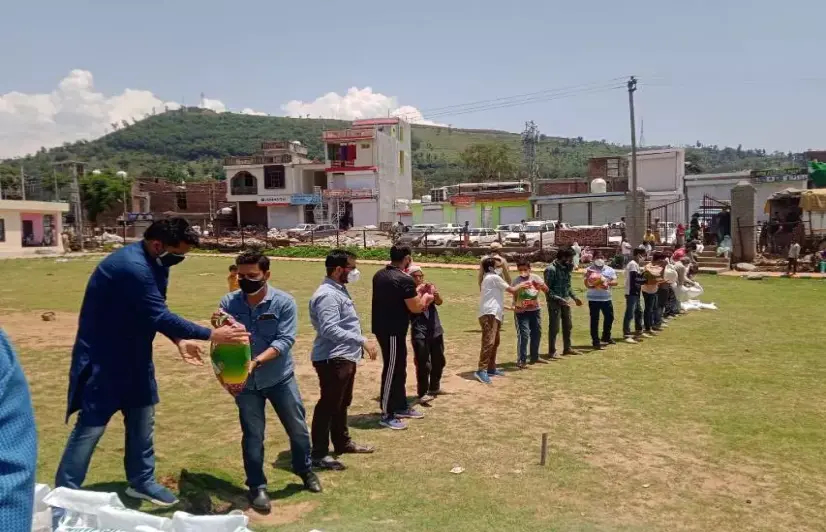Brought together by the pandemic, residents of Rajouri heal old communal scars

Brought together by the pandemic, residents of Rajouri heal old communal scars
In this Muslim-dominated district along the LoC, local civil society actors are coming together to help Hindu migrants in distress.
Rajouri: In the midst of all the despair and hopelessness left behind in the wake of the deadly second wave of COVID-19, a sleepy Muslim-dominated district in Jammu and Kashmir has become a beacon of hope and communal harmony.
Several Muslim activists in Rajouri have joined hands to help the predominantly Hindu migrant daily wagers who had come to J&K from different parts of the country to earn a living.
After a spate of deaths and infections were reported in the union territory, the administration of J&K imposed a strict curfew in late April, restricting the movement of people and shutting down most work. This lockdown, which had been put in place till the end of May, has directly impacted the livelihoods of these daily wagers. While a partial unlock has been announced in June, it's not expected to bring much relief to these migrants.
Rajouri district is located in the Jammu division of the UT and is close to the Line of Control. It had frequently witnessed firing from across the border until early this year when India and Pakistan agreed to strictly follow the ceasefire. As per official records, the district has witnessed 149 deaths due to COVID-19 and 8,778 cases of infection since the start of the pandemic last year.
In Rajouri, where Muslims constitute over 62% of the population and Hindus make up around 34%, the different community members usually live in dedicated colonies inhabited by their own. But curiously, many of the migrant Hindu families reside in Bela Colony and Kheora, which are Muslim-dominated areas.
Shafqat Mir, one of the activists who distributed rations and other essential commodities to the Hindu workers, said that these migrants have nowhere to go during the lockdown. “While they are not able to earn anything during the lockdown, they do not possess enough savings to eat food even twice a day.”
Mir said that they are providing food to at least 200 Hindu families till the lockdown ends. “Flour, rice and pulses are also being distributed among the poor in Rajouri who cannot afford to eat amid the lockdown. These people include those who are self-employed.”
Kamlesh Kumar (42), a migrant worker from Bihar residing in Bela Colony of Rajouri, was left without any work after the lockdown. Kumar worked as a mason and was paid at the end of each day’s work. “I, along with my wife and two children, could sustain ourselves for only three days after a lockdown was imposed. After this, I borrowed Rs 3,000 from a local building contractor who often gives me work. However, the money was exhausted in just 15 days.”
“Then, I received a call from the contractor who said that some people were distributing free rations to workers and I could approach them. From them, I got flour, rice and other eatables for my family. The local Muslims have really come to our aid,” said Kumar.
Tense situations have risen in the past when communal disharmony cast a shadow over the population of Rajouri. However, these Muslim activists believe that it is now time to forget about those divides created along religious lines and work to strengthen the social fabric of the town.
Tazeem Dar, a youth leader from a political party, is distributing free rations, vegetables and soaps to the poor Hindu migrant families. “I am a human before I am a politician. I will talk and act like a politician when the time comes but this is not that time. People believe that Hindus and Muslims in J&K do not live in a cordial atmosphere. We are helping defeat the ideology of hatred and letting people know that the virus does not discriminate between Hindus or Muslims and that we need to unite as humans to defeat it,” said Dar.
The local Islamic Welfare Organization has also extended a helping hand during this time of need and is helping the unprivileged, irrespective of their religion. They have ordered two oxygen concentrators, 400 oximeters, high flow oxygen masks and sanitisers, to be distributed on demand. They also plan to distribute rations and vegetables in far-flung areas of Rajouri district.
With inputs from Jamsheed Malik
Would you like to Support us
101 Stories Around The Web
Explore All NewsAbout the Reporter
Write For 101Reporters
Would you like to Support us
Follow Us On
